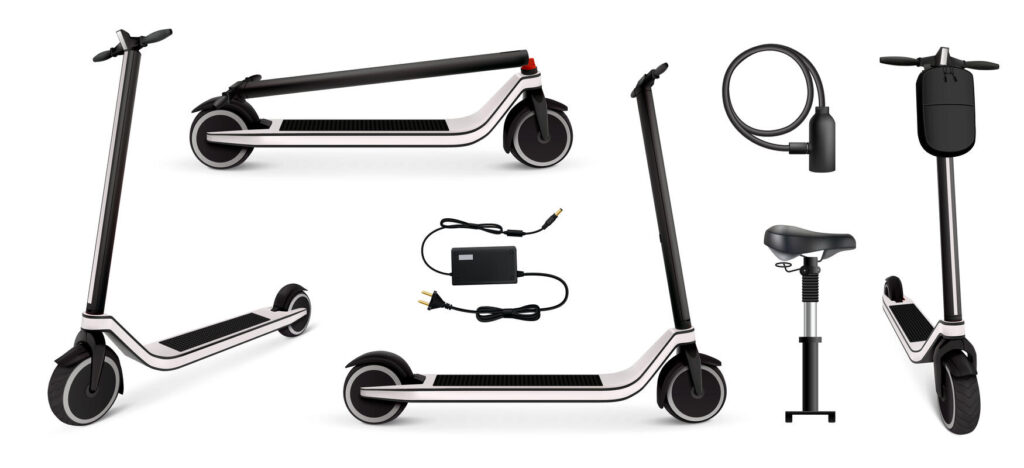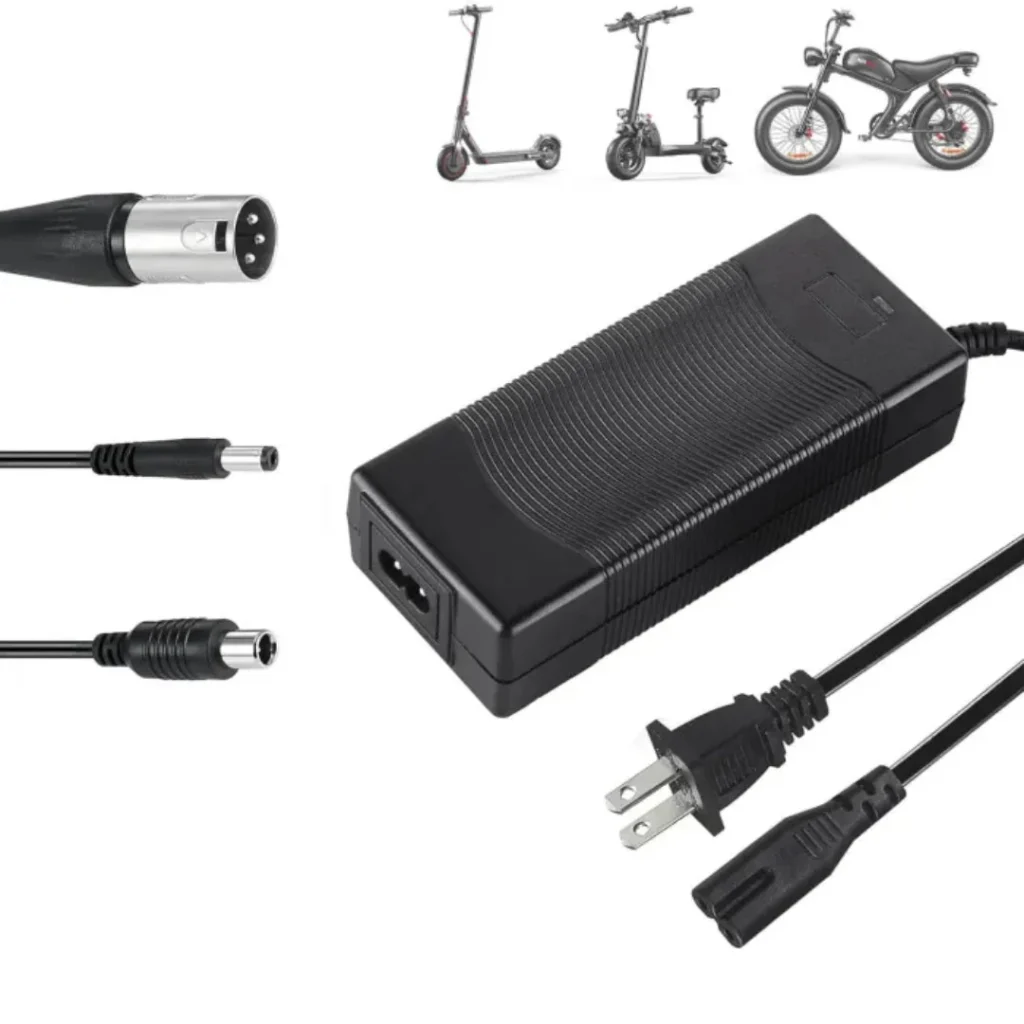
types of electric scooter chargers have quickly become a favorite mode of transport for city commuters and adventure enthusiasts alike. But while many people focus on speed, design, and battery life, one crucial accessory often gets overlooked: the charger. Choosing the right charger is just as important as picking the scooter itself because it directly affects your scooter’s performance, battery longevity, and overall safety.
When it comes to charging, not all chargers are created equal. There are different types of electric scooter chargers available, each designed to meet specific battery requirements and user needs. Understanding these differences can save you from costly mistakes, ensure faster charging, and help maintain your scooter battery in the best possible condition.
In this article, we’ll explore the various types of electric scooter chargers, discuss how to choose the right one, and provide tips to extend the life of both your charger and battery. Whether you are a casual rider or a daily commuter, this guide will make sure you’re fully informed before making a purchase.
Understanding Electric Scooter Batteries
Before diving into the different types of electric scooter chargers, it’s essential to understand the batteries they power. After all, the right charger depends entirely on your scooter’s battery type and specifications.
Most electric scooters use lithium-ion batteries, prized for their light weight, high energy density, and longer lifespan. Some older or budget models may still use lead-acid batteries, which are heavier and require more careful maintenance. Knowing your battery type is the first step in choosing a compatible charger.
Key battery details to check:
-
Voltage: Common scooter batteries range from 24V to 48V. The charger must match the voltage exactly to avoid damage.
-
Capacity: Measured in ampere-hours (Ah), capacity determines how long your scooter can run on a full charge. Larger batteries may need chargers with higher current ratings for efficient charging.
-
Battery Chemistry: Lithium-ion batteries tolerate fast charging better, while lead-acid batteries require slower, steady charging to maintain longevity.
Understanding these battery characteristics not only helps in selecting the correct charger but also ensures safety and optimal performance. Using a fast charger on a battery that isn’t designed for it can shorten the battery’s lifespan or even pose a safety risk.
Types of Electric Scooter Chargers
When it comes to keeping your scooter powered up, not all chargers are the same. Understanding the types of electric scooter chargers available can help you pick the right one for your battery, lifestyle, and riding needs.
Standard Chargers
These are the chargers that typically come with your scooter. They provide a steady and reliable charge and are designed specifically for your scooter’s battery voltage and capacity. Standard chargers are ideal for daily charging and maintaining battery health.
Pros:
-
Safe and compatible with your scooter
-
Affordable and widely available
Cons:
-
Slower charging time compared to fast chargers
Fast Chargers
Fast types of electric scooter chargers provide higher voltage or amperage, allowing your scooter battery to charge more quickly. This is perfect for riders who need a rapid turnaround between rides.
Pros:
-
Significant reduction in charging time
-
Convenient for heavy users or commuting
Cons:
-
Can slightly reduce battery lifespan if used constantly
-
Usually more expensive
Portable Chargers
Portable chargers are compact and lightweight, making them ideal for travel or situations where you may not have access to a standard power outlet. Many portable chargers also have foldable plugs or travel-friendly designs are some types of electric scooter chargers.
Pros:
-
Travel-friendly and easy to carry
-
Can be used on multiple scooters if compatible
Cons:
-
Often slower than standard or fast chargers
-
May require adapters for different regions
Universal Chargers
Universal chargers can work with a variety of scooter brands and battery types. They are versatile, making them a great backup charger for households with multiple scooters or different models.
Pros:
-
Multi-brand compatibility
-
Convenient as a spare charger
Cons:
-
May not charge as efficiently as a brand-specific charger
-
Slightly higher cost
Smart Chargers
Smart types of electric scooter chargers come with advanced features such as automatic shut-off, temperature monitoring, and sometimes even app connectivity. They help prevent overcharging and overheating, making them the safest choice for modern scooters.
Pros:
-
Protects battery health
-
Some models provide real-time charging info via apps
Cons:
-
Higher price point
-
More complex than standard chargers
By understanding these types of electric scooter chargers, you can make an informed choice based on your riding habits, battery type, and convenience needs.
How to Choose the Right Charger
Choosing the right charger for your electric scooter is just as important as selecting the scooter itself. Using the wrong charger can lead to slow charging, battery damage, or even safety hazards. Here’s a step-by-step guide to help you make the best choice among the types of electric scooter chargers.
Check Battery Voltage and Current
Every scooter battery has a specific voltage (V) and current (A) requirement. Always ensure the charger you choose matches these specifications. Using a charger with incorrect voltage can damage the battery or reduce its lifespan.
Consider Charging Speed
-
Standard chargers are slower but gentler on the battery.
-
Fast chargers are ideal if you need a quick turnaround, but frequent use may slightly reduce battery life.
Decide whether speed or longevity is your priority.
Look for Safety Features
Modern chargers may come with:
-
Overcharge protection
-
Overheat protection
-
Short-circuit prevention
Smart chargers often include these features, offering peace of mind while charging.
Check Compatibility
If you have multiple scooters or plan to upgrade, consider a universal charger. It can work with different brands and battery types, making it versatile and cost-effective.
Portability Needs
If you often travel with your scooter or have limited space at home, a portable charger is ideal. Ensure it’s lightweight and compact, yet capable of handling your scooter’s battery specifications.
Read Reviews and Warranty Info
Finally, check user reviews and warranty details before buying. Reliable chargers often come from trusted brands, ensuring both performance and safety.
By considering these factors, you can confidently choose the charger that best suits your scooter, lifestyle, and battery type.
Common Charging Mistakes to Avoid
Even the best types of electric scooter chargers can’t prevent problems if charging is done incorrectly. Many scooter owners unknowingly damage their batteries or reduce performance by making simple mistakes.
Overcharging the Battery
Leaving your scooter plugged in for too long can overheat the battery, shorten its lifespan, and even pose a safety risk. Smart chargers with auto shut-off features help prevent this issue.
Using Incompatible Chargers
Using a charger that doesn’t match your scooter’s voltage or current can damage the battery and affect performance. Always check specifications before connecting a new charger.
Ignoring Environmental Conditions
Charging in extreme temperatures or humid conditions can negatively affect battery health. Always charge your scooter in a cool, dry place.
Frequent Fast Charging
While fast chargers are convenient, using them constantly on a battery not designed for rapid charging can shorten its life. Alternate between standard and fast charging for better battery longevity and better performance any types of electric scooter chargers.
Neglecting Charger Maintenance
Dust, dirt, or bent connectors can prevent proper charging. Regularly clean and inspect your charger to ensure it works efficiently and safely.
Maintenance Tips for Chargers
Taking care of your types of electric scooter chargers is just as important as maintaining your scooter. Proper maintenance ensures your charger lasts longer, charges efficiently, and keeps your battery safe.
Keep Chargers Dry and Clean
Store your charger in a dry, clean place and wipe it regularly with a soft, dry cloth. Avoid water or harsh chemicals.
Handle Cables and Connectors Carefully
Avoid bending, twisting, or pulling the charger cable aggressively. Damaged cables or connectors can lead to poor charging performance or hazards.
Inspect Regularly for Wear and Tear
Check your charger for frayed wires, bent connectors, or unusual heat during charging. Replace any faulty parts immediately.
Store Properly When Not in Use
If you won’t be using your scooter for a while, unplug the charger and store it safely. Coiling the cable loosely helps prevent damage.
Avoid Extreme Temperatures
Do not expose your charger to very high or very low temperatures. Extreme heat can overheat the circuitry, while cold can affect charging efficiency.
FAQs
Can I use a universal charger on any scooter?
Universal chargers can work with multiple brands, but always check voltage and current requirements. Using the wrong charger can damage your battery.
How long does a standard charger take to fully charge a scooter?
Typically, standard chargers take 4–8 hours, while fast chargers may reduce this to 2–4 hours depending on battery capacity types of electric scooter chargers.
Are fast chargers safe for all battery types?
Not always. Fast chargers are ideal for lithium-ion batteries designed for higher currents. Lead-acid or older batteries may be damaged by rapid charging.
How often should I charge my electric scooter?
It’s best to charge after every ride or when the battery drops below 20–30%. Prevent the battery from draining completely.
Do smart chargers improve battery life?
Yes. Smart chargers stop overcharging, track temperature, and ensure steady voltage. This helps keep batteries healthy and lasting longer.
Conclusion
Choosing the right charger is as important as selecting your electric scooter. There are many types of electric scooter chargers: standard, fast, portable, universal, and smart. Knowing their differences can save you time, money, and battery problems.
Think about your battery type, charging speed, safety features, and portability. This way, you can choose a charger that keeps your scooter ready for any ride. To extend the life of your battery, ensure you use your charger properly. Ensure accuracy and perform regular maintenance. This way, you’ll enjoy reliable performance and peace of mind.
Choosing the right charger protects your battery and improves your ride. It makes each trip smoother and more enjoyable.

